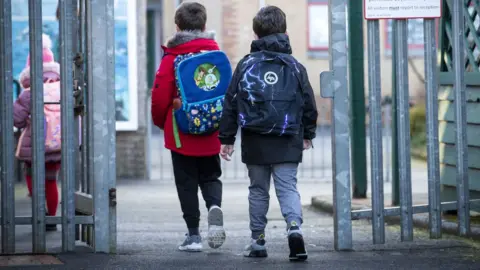School poverty cash at risk in date switch
 Jane Barlow
Jane BarlowSchools in England face a "significant cash loss" from a change in the date for counting disadvantaged pupils eligible for extra support, says the Education Policy Institute.
The think tank warns using an earlier cut-off date to count free school meal pupils will miss many who have since become eligible in the pandemic.
This could lower schools' allocations of "pupil premium" funding.
The Department for Education says an earlier date helps budget planning.
But head teachers have raised "grave concerns" that the change in timing will mean schools serving some of the poorest pupils will miss out on millions in funding, despite rising levels of need.
Instead of using January as the annual point for measuring numbers of pupils eligible for free school meals, the government has used October 2020.
'Poorly-timed'
This has prompted warnings that the earlier date will miss many families caught up in recent months of rising job losses and financial pressures.
If children are not counted, schools could lose out on pupil premium funding, which is mostly based on their number of pupils eligible for free meals.
Pupil premium funding is targeted to help disadvantaged children and provides schools with an extra £1,345 per pupil in primary and £955 per pupil in secondary.
In 2020-21, more than two million children were supported with pupil premium funding worth £2.4bn. This is expected to rise to £2.5bn next year - but there are concerns the change in the date could undercount the need.
"This policy change looks to be poorly timed and is likely to have huge ramifications," said Natalie Perera, Education Policy Institute chief executive.
"Given that there was a likely rise in pupil premium eligibility during this period due to the recession and rises in unemployment caused by the pandemic, this could represent a significant cash loss for schools," she said.
A spokeswoman for the National Association of Head Teachers said this was of "grave concern to school leaders across the country".
"We expect the consequences of this change to be significant," she said.
The impact would not be evenly spread - as pupil premium funding is a much bigger factor in more disadvantaged areas.
In parts of inner London, Birmingham, Manchester, Merseyside and Teesside more than 40% of pupils are eligible, based on deprivation. In Buckinghamshire it is about 13%.
Pupil premium was worth about £95m to schools in Birmingham last year, compared with £3.6m in Windsor and Maidenhead.
'Recover lost education'
The Local Government Association (LGA), representing councils, has backed the warnings.
"It is imperative that no school should lose out in receiving pupil premium funding as a result of this administrative change," said Judith Blake, chair of the LGA's children and young people board.
She said this was particularly important "in the context of the pandemic and the need to ensure pupils from disadvantaged backgrounds are supported to recover lost education".
"There will be many schools with children who will have become eligible for pupil premium between October and January who will now not qualify for this extra funding for a whole year," said Cllr Blake.
The Harris Federation academy trust, with 50 schools mostly in and around London, said more than 500 of its pupils became eligible for pupil premium funding in the gap between the two dates.
Last month, Tony Foot, the Department for Education's director of strategic finance, told the Education Select Committee that he did "not recognise" claims the change in date would save £150m - and said: "I do not have a figure for savings that are associated with that change."
He told MPs it would align pupil premium with core funding, which operates on an October census, and would provide certainty on funding at an earlier point.
A spokeswoman for the Department for Education said: "We are committed to ensuring all children have access to good quality education, no matter their background.
"Using the October census for pupil premium allocation means schools will know their budget earlier in the year, helping them to plan ahead and we expect pupil premium funding to increase to more than £2.5bn in 2021-22."
Schools will also have extra support from £1.7bn in catch-up funding to help recover from the disruption of the pandemic.
